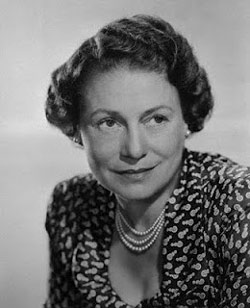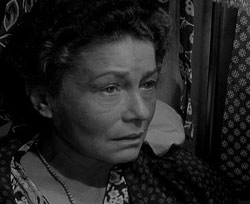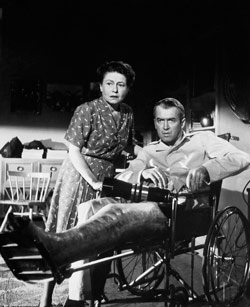
God bless Thelma Ritter. She improved every movie she was ever in by providing an immediate jolt of plain-spoken authenticity. Usually cast as domestic help—the maid, the nanny, the cook—she seemed always to have wandered in from pulling a double shift in the real world.
She didn’t make it onto the silver screen until she was well into her forties, which meant that when she arrived she brought the unmistakable air of a woman who had lived an actual life. The daughter of a Brooklyn shoe company office manager, she was born in either 1902 or 1905 (opinions vary, though most sources list ’05), Ritter started acting as a child and worked her way through various stock companies during high school. After graduating, she attended the American Academy of Dramatic Arts but had to drop out after only one year to find work. Throughout the Depression, she remained a struggling, albeit working, actor on stage (rarely Broadway) and on the radio. She married fellow stage actor Joseph Moran in 1927 and gave birth to two children.
Her big break came in 1947 when producer Darryl Zanuck noticed the wonderfully weary way she read a one-line bit part in Miracle On 34th Street and ordered her role expanded. He signed her to an exclusive contract and Ritter’s film career as the embodiment of the working-class everywoman began.
She delivered standout performances in classics like All About Eve, The Misfits, and Pillow Talk, but her best roles came in crime films.

In her last scene, staring down a killer, she gets to deliver a speech that sums up the Ritter ethos in this picture and so many others:
When I come in here tonight, you seen an old clock runnin’ down. I’m tired. I’m through. Happens to everybody sometime. It’ll happen to you too, someday. With me it’s a little bit of everything. Backaches and headaches. I can’t sleep nights. It’s so hard to get up in the morning and get dressed and walk the streets. Climb the stairs. I go right on doin’ it! Well, what am I gonna do, knock it? I have to go on makin’ a livin’ . . . so I can die.
Perhaps her best known role was as Stella, Jimmy Stewart’s homecare nurse in Alfred Hitchcock’s Rear Window. While Stewart peeks in his neighbors’ windows and makes out with Grace Kelly, Ritter keeps tossing him verbal grenades like “We’ve become a race of Peeping Toms. What people ought to do is get outside their own house and look in for a change.”
Or this gem:
You heard of that market crash in 1929? I predicted that. I was nursing a director of General Motors. Kidney ailment, they said. Nerves, I said. And I asked myself, ‘What’s General Motors got to be nervous about?’ Over-production, I says; collapse. When General Motors has to go to the bathroom ten times a day, the whole country’s ready to let go.

On television she grabbed a rare starring role in a gruesomely funny episode of Alfred Hitchcock Presents called “The Baby Sitter.” The episode positions her once again as the blunt working woman (“What is my precious time worth? Eighty-five cents an hour.”) but gives her the opportunity to explore the dark side of that character. Ritter plays a babysitter who is thrilled when her employer’s wife is murdered because she has dreams of marrying the dead woman’s rich husband. In some ways the film is a mean joke—as so many episodes of the show were—because the humor derives from the older working-class woman’s delusions. That makes it all problematic, of course, but Ritter is still strangely touching as a woman daring to dream of love and wealth—even though that dream turns into a nightmare by the end.
Over the course of her career, Ritter was nominated for six Academy Awards (All About Eve, The Mating Season, With A Song In My Heart, Pickup On South Street, Pillow Talk, Birdman Of Alcatraz) but never won—proof, if any is needed, that the Oscars are entirely pointless. Thelma Ritter was as fine an actor as ever worked in movies, but she was never flashy or fashionable, and never seemed to reach for effect. She just seemed real.
Jake Hinkson, The Night Editor, is the author of Hell on Church Street.
